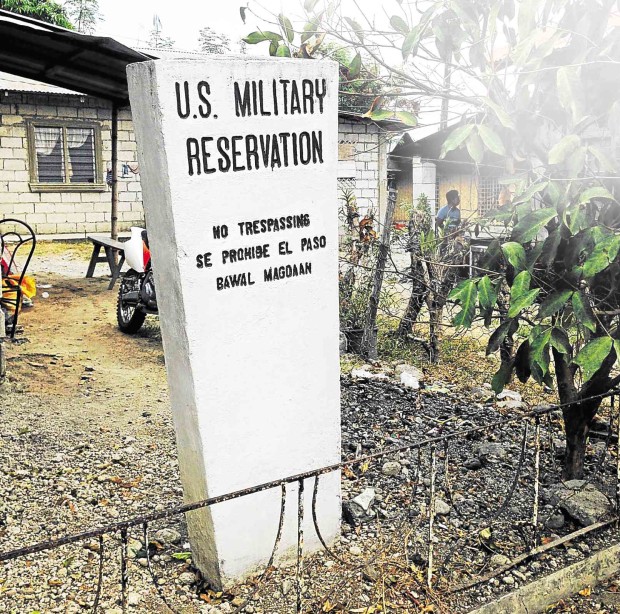
FROM being a US military base where access by Filipinos is restricted, Clark is becoming one of the fastest growing economic hubs in the country and now site of the Clark Green City. TONETTE S. OREJAS/INQUIRER CENTRAL LUZON
CLARK FREEPORT—In less than two months, the sentiment has changed among farmers in the upland villages of Capas town in Tarlac province about a plan to create the Clark Green City (CGC).
Most of them gained a sense of certainty when their kabalen (provincemate), President Aquino, led groundbreaking rites of the project on April 11 behind a World War II shrine in Barangay Aranguren in Capas.
“Malaus ne (It’s going to push through),” Reynaldo Catacutan, president of Capas Green City Farmers Association, told reporters when the project’s time capsule was laid.
The city in the making, spanning 9,450 hectares, sits within 36,000 hectares of military base land formerly rented by the United States until 1991 when the Philippine Senate ordered the closure of American bases and the pullout of the troops.
Diverse
In so huge an area located north of Clark, the project is diverse.
Aside from size, there’s nothing like its concept. Proposed by the state agency, Bases Conversion and Development Authority (BCDA), and approved by the National Economic and Development Authority in 2013, the Clark Green City is “primed as the Philippines’ most modern and the first technologically integrated city with a mix of residential, commercial, agroindustrial, institutional and information technology developments at the same time having a green, sustainable and intelligent community for its residents, workers and business establishments.”
During the groundbreaking rites, Mr. Aquino said CGC would be “home to companies, retail outlets, schools, government offices, residential communities, parks and even urban farms, eventually accommodating an estimated 1.12 million residents and 800,000 workers.”
Excited
Residents and farmers are excited because Mr. Aquino mentioned that the first five years are going to generate P64.7 billion of investments.
“We knew BCDA was starting to make the Green City. Its contractors are finishing a road network. BCDA also started paying damage compensation to farmers at P300,000 per hectare. We were also promised lots that we will cultivate soon. The basics like roads and lands are being prepared,” Catacutan said.
Catacutan, a Liberal Party member who was elected new Capas mayor in the May 9 elections, said he would continue supporting the CGC “as long as the interests of our farmers and people are protected.”
BCDA has laid the foundations of CGC, a review of the agency’s accomplishments and activities showed. It has secured the support of Japan and France for longstanding cooperation in sustainable urbanization, enabling it to link with Japan’s JOIN (Japan Overseas Infrastructure Investments Corporation for Transport and Urban Development) and France’s Vivapolis in tapping the private sector in developing the new city.
To turn CGC into an educational hub and to develop excellent human resources, BCDA signed agreements for the global campus of the University of the Philippines, a fablab (fabricator/laboratory) with the Philippine Science High School, and an industrial and technology skills center with the Technological University of the Philippines.
BCDA signed a joint venture contract with Filinvest Land Inc. to develop 288 ha into an industrial zone with residential, office, commercial and institutional components.
BCDA leased 260 ha to Sunray Power Inc. as site of an P11.75-billion, 100-megawatt solar power facility.
It has bid out a low-cost housing project in 279 ha for 85,000 workers who will relocate to the CGC.
Congress expressed support for CGC through House Resolution No. 116. BCDA sought proposals for the conduct of feasibility studies on various utilities such as power, water (supply, distribution and waste water management), solid waste management, mass transportation, centralized liquefied petroleum gas or liquefied natural gas system, and information and communication technology or city management systems.
Arnel Paciano Casanova, president and chief executive officer of BCDA, said he expected continuity despite the leadership change because most of the important contracts, such as the access roads and the initial phase of the 288 ha in the planned 9,450-ha CGC, had been signed and were being implemented.
“With valid contracts, they are constitutionally protected,” he said.
Casanova said presumptive President-elect Rodrigo Duterte had “expressed support for Clark development during the campaign [and] is advocating the development of areas outside Manila.”
“So legally and politically, the project continuity is assured,” said Casanova, whose stint in BCDA is co-terminus with Mr. Aquino’s term.
BCDA is submitting a transition report to Duterte and his team. “We want to support the next leadership for the continuity of good programs that President Aquino started, and implement new ones that President-elect Duterte wants to do. Let’s work as one for the country,” Casanova said.
BCDA accomplishments
A part of the report cited accomplishments that included the recovery of 47 ha of Philippine Navy land estimated to be worth P47 billion and the collection of P6.35-billion receivables, which were reduced to only P475 million.
“Financially, the accomplishments are remarkable from 2010 to 2015,” Casanova said, referring to the cash inflow that grew from P5.4 billion in 2010 to P10.6 billion in 2015.